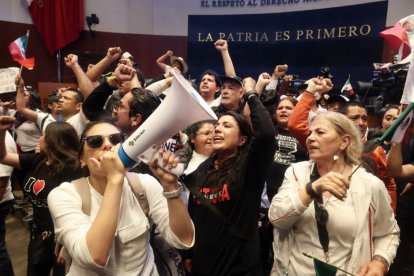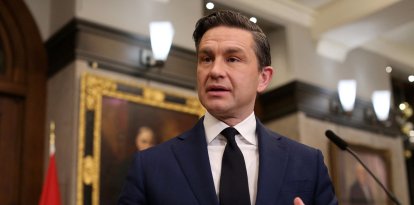Crisis in Mexico: Demonstrators break into the Senate to protest AMLO's judicial reform
The bill proposes that more than 6,500 judges, including those of the Supreme Court, be elected by popular vote.

Protesters at the National Congress in Mexico City.
Mexico's Senate was the scene of intense protests on Tuesday. Protesters managed to enter the chamber in rejection of the controversial judicial reform proposed by outgoing president, Andrés Manuel López Obrador. The protesters, chanting "traitors," forced Senate President Jose Gerardo Fernandez to temporarily suspend the session while they expressed their opposition to what they consider an attack on the country's justice and democracy.
Reform at the center of controversy
The reform project, promoted by López Obrador, proposes that more than 6,500 judges, including those of the Supreme Court, be elected by popular vote. This proposal has generated widespread rejection among sectors of the judicial system and the citizenry, who fear that the judicial process's politicization could undermine the courts' impartiality and autonomy.
Since the reform was presented, numerous protests have taken place. Judges and lawyers have led these movements, warning about the risks of the judicial system becoming a tool of political power. Concern has intensified with the recent indefinite strike of judicial sector workers.
Pressure and controversy in the Senate
The reform still needs to be approved by the Senate, which has generated additional tension. The ruling bloc, composed of the Movimiento Regeneración Nacional (Morena) and its allies, has 85 seats in the Senate but needs an absolute majority to pass the reform.
International reactions
The reform has attracted attention not only domestically but also internationally. The United States and Canada, Mexico's key trading partners, have expressed concern, noting that the reform could affect the trilateral trade agreement. Meanwhile, agencies such as the UN and Human Rights Watch have warned about the potential weakening of the separation of powers.
"If it's not done right, it can bring a lot of damage to the (U.S.-Mexico) relationship. I'm not just saying that as ambassador, I'm saying that because of all the concerns that are coming to me from people who really want what's best for Mexico and the United States. There is a lot of concern," U.S. Ambassador to Mexico Ken Salazar commented.
RECOMMENDATION





















